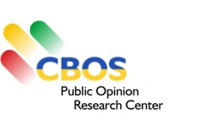| LATESTPUBLICATIONS Polish Public Opinion December 2022
 | Politicians of the year 2022
|
 | Evaluation of the year 2022
|
 | Long-term effects of COVID-19
|
 | Opinions about education
|
"Opinions and Diagnoses"no 48
Young Poles in CBOS Surveys 1989–2021
no 49
Youth 2021
no 50
Secularisation in Poland
Reports | Polish Schools 2022
|
 | Women's Procreative Attitudes
|
 | Psychological Wellbeing in 2022
|
 | Life Satisfaction in 2022
|
 | Social Moods in 2022
|
 | Political Party Preferences in January
|
 | Opinions about Parliament and President in January
|
 | Social Moods in January
|
 | Moods on the Job Market in January
|
 | Trust in Politicians at the Beginning of the Election Year
|
 | Poles about War in Ukraine and Ukrainian Refugees
|
|
|
What Frame of Mind Do People Seem to Be in?
| When describing the predominant mood of the people around them, four fifths of Poles (83%) were mostly aware of negative feelings. Most often other people were seen to be fearful and anxious about an uncertain future (60%). Less frequently they seemed generally unhappy, with no hope of things getting better (14%) or apathetic, resigned and accepting of their lot (9%). Only a total of 13% of respondents, when asked about the most common frame of mind of those around them, could see a predominance of positive feelings, people who were relaxed and pleased that things had got a bit better (9%), or, less frequently, who believed things were actually getting better (4%).
| 2022 has been another year in which a general drop in people’s spirits could be observed throughout society. The clear worsening of people’s mood brought on by the Covid pandemic has only deepened, undoubtedly affected by the war in Ukraine, and the energy and cost of living crises. Compared to 2021 there has been a drop in the percentage of people observing largely positive feelings around them (by 7 percentage points) and a rise in those whose perception was of negative emotions (by 8 points). There was a clear increase in the proportion of those who noticed mostly fear or anxiety about the future (up by 15 points) and this percentage is now the highest since 1988. Fewer respondents saw others as relaxed and pleased that things had got better (down by 7 points), but interestingly, fewer people were considered to be apathetic, resigned and accepting their of lot. This was also a drop of 7 points, to the lowest level since CBOS records began. So, despite the uncertain situation, Poles were not inclined to react with passivity and resignation.
| |
| More on this subject in the CBOS report.
| This ‘Current Events and Problems’ survey (392) was conducted using a mixed-mode procedure on a representative sample of named adult residents of Poland, randomly selected from the National Identity Number (PESEL) register. Respondents independently selected one of the following methods: Computer Assisted Personal Interview (CAPI); Computer Assisted Telephone Interview (CATI), respondents receiving researchers’ telephone numbers in an introductory letter from CBOS; Computer Assisted Web Interview (CAWI), where respondents filled in the online questionnaire independently, gaining access by means of a login and password provided in an introductory letter from CBOS. In all three cases the questionnaire had the same structure and comprised the same questions. The survey was carried out between 28 November and 11 December 2022 inclusive on a sample of 1018 people (54.5% using the CAPI method, 29.8% CATI and 15.7% CAWI). CBOS has been conducting statutory research using the above procedure since May 2020, stating in each case the percentage of personal, telephone and internet interviews.
|
|



